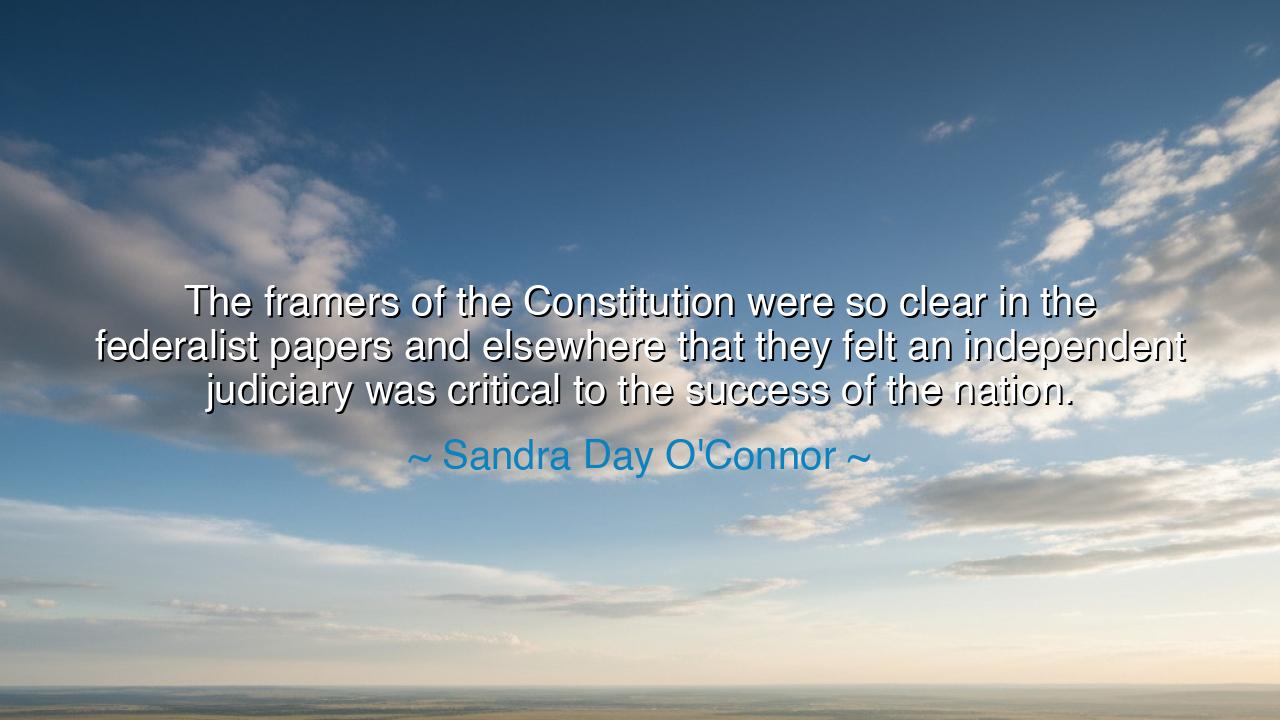
The framers of the Constitution were so clear in the federalist
The framers of the Constitution were so clear in the federalist papers and elsewhere that they felt an independent judiciary was critical to the success of the nation.






When Sandra Day O’Connor declared, “The framers of the Constitution were so clear in the Federalist Papers and elsewhere that they felt an independent judiciary was critical to the success of the nation,” she was not merely reciting history, but reminding us of a pillar upon which the republic itself stands. Her words thunder with the wisdom of the ancients: that no society can endure where justice is chained to the will of kings, mobs, or factions. The independent judiciary is the guardian of balance, the shield of the weak, and the final interpreter of the law that binds both ruler and ruled.
The ancients also recognized this truth. In Athens, courts of citizens stood to temper the passions of the Assembly, and in Rome, magistrates and praetors upheld the codes that prevented the republic from descending into chaos. The American framers, drawing upon this long heritage, declared in the Federalist Papers that liberty could not survive unless judges stood apart from transient powers, free to uphold the Constitution even against the clamor of the day. O’Connor, herself a guardian of the Constitution, spoke from this lineage, reminding us that without such independence, the law becomes merely the weapon of the strong.
History gives us many examples of what happens when this principle is forsaken. In the final days of the Roman Republic, when courts bent under the weight of Caesar’s ambition and Pompey’s fear, the law became a tool of war rather than of justice. Rome did not fall to foreign enemies first—it collapsed inward, because its guardians no longer stood apart. Contrast this with the United States in its early years: even in moments of great division, the judiciary, though imperfect, sought to anchor the ship of state in the steady harbor of law.
Sandra Day O’Connor herself embodied this ancient calling. As the first woman to sit upon the Supreme Court, she knew that the robes she wore were not merely symbols, but shields of impartiality. Her reminder about the framers’ clarity was not an academic note—it was a warning to future generations. For if courts lose independence, then liberty itself will be devoured by faction, corruption, or tyranny. The success of the nation, as she proclaimed, rests not in wealth, armies, or power, but in the enduring impartiality of justice.
There is also humility in her words, for she points us not to her own wisdom, but to the wisdom of the framers. They, in their foresight, saw that men are frail, passions are strong, and power corrupts. Their answer was the creation of a judiciary shielded from the fury of politics. O’Connor’s declaration is thus a call to honor the inheritance we have received: an institution designed not to serve rulers or parties, but to serve the law, and through it, the people.
The lesson for us is this: guard the independence of justice as you would guard the walls of your city. Do not allow the courts to be swayed by flattery, by fear, or by the demands of passing factions. For when justice is corrupted, the very foundation of the nation cracks, and all else—prosperity, freedom, peace—will soon collapse. Let the judiciary stand apart, as a temple where truth is sought and fairness prevails, even when such truth cuts against the grain of power.
Practically, this means cultivating reverence for the rule of law in our daily lives. Respect the courts, even when their rulings displease you. Defend the principle of independence when it is threatened, whether by rulers who seek to dominate or by crowds who seek to destroy. Teach your children not only the stories of victory and war, but the quieter victories of law upheld, of justice preserved. In this way, you strengthen the invisible fortress that protects liberty.
Thus, O’Connor’s words stand as both warning and commandment: the success of the nation rests not upon wealth or might, but upon the independent judiciary the framers envisioned. To abandon it is to betray the heart of the republic. To preserve it is to ensure that generations yet unborn may live in freedom, guided not by the passions of the day, but by the steady light of justice eternal.






AAdministratorAdministrator
Welcome, honored guests. Please leave a comment, we will respond soon